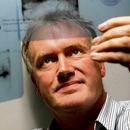Academic Editors
The following people constitute the Editorial Board of Academic Editors for PeerJ. These active academics are the Editors who seek peer reviewers, evaluate their responses, and make editorial decisions on each submission to the journal. Learn more about becoming an Editor.

Conor P O'Byrne
Director of the Bacterial Stress Response Group, Senior lecturer in Microbiology at the National University of Ireland, Galway. The research focus in my group is on the molecular mechanisms that food-borne bacterial pathogens use to sense and respond to harsh conditions in their environment. Pathogens encounter major physicochemical changes as they transition from food into the host, particularly in relation to pH, osmolarity, oxygen concentration, light and temperature. Understanding how pathogenic bacteria detect and respond to these changes is critical if we are to devise sensible strategies to prevent their entry into the food chain and to prevent infections from arising in the human population. In my laboratory we study two important food-borne pathogens, Listeria monocytogenes and Escherichia coli.

Wayne A. O'Connor
Dr O’Connor is a Senior Principal Research Scientist and Research Leader for Aquaculture at Fisheries New South Wales’ Port Stephens Fisheries Institute. His undergraduate studies were undertaken at Newcastle University and he received his PhD from the University of Technology, Sydney, working on aspects of scallop physiology and reproductive biology. He has 30 years experience in Aquaculture research and has worked on a variety programs including algal culture and the development of propagation techniques for a number of molluscs such as oysters (edible and pearl), scallops, mussels and clams. Currently, Dr O’Connor leads molluscan research programs that range from the development of selective breeding techniques and triploid induction to environmental impact and ecotoxicological evaluations. Dr O'Connor is a member of the editorial boards for the journals Aquaculture and Aquaculture Research. Molluscan Research and Water. He is a Conjoint Professor in Life Sciences at Newcastle University, an Adjunct Professor in Genecology at the University of the Sunshine Coast and a Visiting Fellow at Macquarie University.

Lorraine O'Driscoll
Lorraine O'Driscoll (BSc(Hons, Pharm), MSc(Res, Clin Pharm), MA(Ed), PhD(Biotech), FTCD) Lorraine holds a BSc(Hons),pharmacology; MSc(Res), clinical pharmacology; MA, education; PhD, biotechnology. In 2012, she was elected to Fellowship in TCD. Following her PhD, Lorraine undertook biotechnology/biomedical research for US and EU industry (including Berlex; Archport Ltd-Axonobel; MediSyn Ltd; MedaNova Ltd.) before returning to academia. At post-doctoral level, she gained experience at the Dana-Farber Harvard Cancer Institute and University of Miami. Prior to joining TCD in 2008, Lorraine most recently held the position of Senior Research Programme Leader and Lecturer in School of Biotechnology, DCU.
Her research group focuses on diagnostic, prognostic and predictive biomarkers; discovering new therapeutic targets; cancer cells communication via exosomes, microvesicles and CTCs; elucidating and circumventing resistance to targets agents and classical chemotherapy; associations between obesity, metabolic syndrome and cancer.
She has been a P.I. on 5 cancer clinical trials with ICORG. She is TCD's Principal Investigator on SFI-supported Molecular Therapeutics for Cancer Ireland; Strand Leader of Irish Cancer Society-supported Breast-PREDICT; and P.I. and Chair, H2020-supported European Network Cooperation in Science and Technology focussed on Exosomes & Microvesicles in Health & Disease which brings together researchers from around the world, in academia and industry.

Luke O'Neill
Chair of Biochemistry at Trinity College Dublin & Academic Director of the Trinity Biomedical Sciences Institute. Awards include the Royal Irish Academy Medal for Biochemistry, The Irish Society for Immunology medal, the Royal Dublin Society/Irish Times Boyle medal for Scientific Excellence & the Science Foundation Ireland Researcher of the Year Award. Co-founder and director of Opsona Therapeutics. In 2008 he was appointed Chair of the Immunity & Infection panel of the European Research Council

Sebastian Oberst
Dr Oberst works as Associate Professor at the Centre for Audio, Acoustics and Vibration (CAAV) at the University of Technology, Sydney, and is head of the Biogenic dynamics group conducting research in bioacoustics, complex dynamics, and acoustic/biogenic (meta-)materials. His research is applied to the eusociality of insects, (primarily termites, but also bees) and the structures they build, extending to their vibro-acoustic communication signals following the noise control engineering principle. Nonlinear time series analysis or methods used in engineering and physics are key elements of his research applied to the life sciences, especially behavioural ecology.

Zoran Obradovic
Zoran Obradovic is L.H. Carnell Professor of Data Analytics at Temple University, Professor in the Department of Computer and Information Sciences with a secondary appointment in Statistics, and is the Director of the Center for Data Analytics and Biomedical Informatics. He is an Academician at the Academia Europaea (link is external) (the Academy of Europe) and a Foreign Academician at the Serbian Academy of Sciences and Arts (link is external). He is the executive editor at the journal on Statistical Analysis and Data Mining, which is the official publication of the American Statistical Association and is an editorial board member at eleven journals. He was the chair at the SIAM Activity Group on Data Mining and Analytics for 2014 and 2015 years, was co-chair for 2013 and 2014 SIAM International Conference on Data Mining and was the program or track chair at many data mining and biomedical informatics conferences. His work is published in more than 300 articles and is cited more than 15,000 times (H-index 48).

Emmanuel Nene Odjidja
Emmanuel Nene Odjidja is an epidemiologist and public health consultant. He obtained his MSc degree in Global Health from the Queen Margaret University in Edinburgh and is currently interested in control of infectious diseases during pregnancy and understanding the linkages between diet-induced inflammation and the onset of cardiometabolic risks and diseases.

Agricola Odoi
Agricola Odoi, BVM, MSc, PhD, FAHA, FACE, Dipl. AVES (Hon) is a Professor of Epidemiology with specific interests and expertise in geographic and quantitative epidemiology. He earned his veterinary degree from Makerere University (Uganda), MSc in Epidemiology and Animal Health Economics from University of Nairobi (Kenya) and PhD in Epidemiology from University of Guelph (Canada).
Dr. Odoi’s research involves use of Geographical Information Systems (GIS) and Spatial Epidemiology to investigate health disparities and the impact of place on health outcomes and access to health services. He has used these approaches in the investigation of vector-borne, water-borne and chronic diseases. His investigations have focused on identifying the influence of place of residence on health so as to provide information to guide health planning and policy decisions.
He has been actively involved in research on the epidemiology of prediabetes, diabetes, heart disease and stroke. Using GIS and spatial epidemiologic tools, Dr. Odoi has also been involved in research investigating vector distribution, habitat preference and predictors of geographic distribution of vectors and hence risk of a number of vector-borne diseases. As a result of his significant research contributions he was inducted a Fellow of the American Heart Association (FAHA), Fellow of the American College of Epidemiology (FACE) and received an Honorary Diplomate of the American Veterinary Epidemiology Society (Dipl. AVES).

Audrey R Odom John
Chief, Division of Infectious Diseases, Children's Hospital of Philadelphia
The primary research goals of our lab are to understand the biological functions of specific metabolic pathways in the malaria parasite--that is, to understand what the parasite needs to make, and why it needs to make it.

Jörg Oehlmann
Graduated as Dr. rer. nat. at University Münster in 1994. Habilitation at the International Graduate School Zittau in 1998. 2001-2004: Full professor (C3) for Ecology and Evolutionary Biology at Goethe University Frankfurt. Since 2004 full professor (C4) for Aquatic Ecotoxicology at Goethe University Frankfurt.
Head of the Department Aquatic Ecotoxicology and the Master's Programme in Environmental Sciences at Goethe University.
Primary research interests: Biological effects monitoring, endocrine active chemicals, pharmaceuticals and personal care products in the environment, effects of microplastics on aquatic organisms, development of an integrated water resource management.

Charles Ofria
Professor of Computer Science at Michigan State University; Director of the Digital Evolution Laboratory and Deputy Director of the BEACON Center for the Study of Evolution in Action.
Charles Ofria director of the Digital Evolution Laboratory. He conducts research on evolution in artificial systems and applies the results to problems in computer science and evolutionary biology. He developed Avida, a software-based research platform consisting of populations of 'digital organisms used in biological research. His work has been published in Science and Nature and his research has received international media attention in forums such as Discover Magazine, National Geographic, CNN, the BBC, New Scientist, and the New York Times.

Olorunseun O Ogunwobi
Dr. Ogunwobi obtained a medical degree from the University of Ibadan, Nigeria, a master's degree in biomedicine from the University of Hull, United Kingdom, a master's degree in clinical and translational science from the University of Florida, Gainesville, and a PhD in molecular biology from the University of East Anglia, Norwich, United Kingdom. He was the Founding Director of the Hunter College Center for Cancer Health Disparities Research. He is now the Barnett Rosenberg Professor of Biochemistry and Molecular Biology and Chairperson in the Department of Biochemistry and Molecular Biology at Michigan State University. In addition, he will serve as Co-Director of the forthcoming Center for Cancer Health Equity Research (CCHER) at Michigan State University. He is a translational cancer biologist whose work focuses on molecular mechanisms of progression of solid organ cancers with racial disparities, and on approaches to leverage non-coding RNA biology for potential clinical applications in cancer. His work has been funded by the National Institutes of Health, New York State, Carnegie Corporation of New York, and the National Science Foundation, among others. Dr. Ogunwobi was a Founding Contact Principal Investigator of the Synergistic Partnership for Enhancing Equity in Cancer Health (SPEECH) funded by U54 grants CA221704 and CA221705 from the National Cancer Institute. An author of 74 peer-reviewed journal articles and 3 book chapters, Dr. Ogunwobi has been issued 5 US patents for biotechnology inventions with potential clinical applications in cancer. He is the recipient of the 2022 Hunter College Presidential Award for Excellence in Scholarship or Creative Activity, and selected as a Jefferson Science Fellow by the National Academies of Sciences, Engineering, and Medicine, and as a Fellow of the Academy of Medicine Specialties of Nigeria. He is Co-Founder of UTR Therapeutics, Inc (winner of the 2023 XSeed Award from Deerfield), and NucleoBio, Inc.

